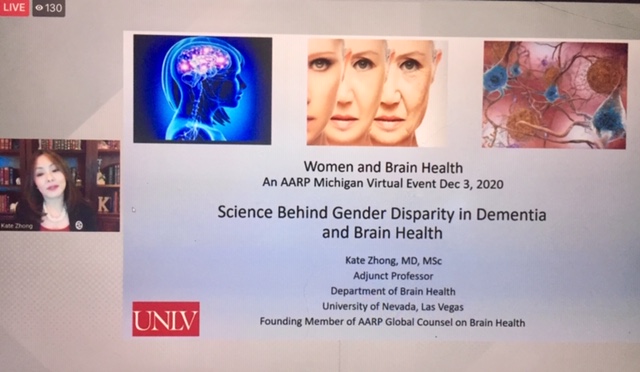AARP Hearing Center

An all-star panel of experts on women’s brain health and wellness led a 90-minute virtual event viewed by more than a thousand people on Dec. 3.
The interactive virtual discussion, Women and Brain Health: It’s Time to Act, was hosted by AARP Michigan. Women are more likely than men to be diagnosed with dementia. The event focused on the biological and social factors now thought to be behind the gender disparity, and offered practical steps women can take to improve their brain health. Participants had an opportunity to ask questions live.
Panelists were:
- Sarah Lenz Lock, Executive Director of the Global Council on Brain Health and Senior Vice President in AARP’s Policy, Research and International Affairs. The Global Council is an independent collaborative of scientists, doctors and policy experts convened by AARP to provide trusted information on brain health.
- Dr. Kate Zhong, a geriatric psychiatrist, pharmacologist, brain health advocate, and founding member of the AARP Global Council on Brain Health. She is an Adjunct Professor at the University of Nevada-Las Vegas, and founder of the Brainnovation Initiative.
- Laura Rice-Oeschger, Licensed Master Social Worker and Managing Director, Wellness Initiative, University of Michigan Alzheimer's Disease Center (MADC). Moved by family experiences with long-term illness and memory loss, she has worked in dementia care since 1996.
Lock kicked off the conversation citing statistics showing women are at greater risk of being victims of Alzheimer’s.
“One in five women older than 45 will develop Alzheimer’s in their lifetime, in contrast to one in ten men,” Lock said.
By 2050, 13.8 million Americans will be living with dementia, 9 million of them women, she said. For many years, women’s higher dementia numbers were generally seen as a consequence of women living longer than men, 4-5 years on average.
But evidence now points to women’s biology and a range of social factors that may influence whether a person gets dementia. Factors disproportionately affecting women include: high stress, low levels of physical activity, inadequate diet, lack of adequate sleep, depression and work behaviors. Women also make up 60 percent of caregivers, which can cause high stress levels, tendencies to ignore self-health, and lower income levels because they frequently must reduce or quit work.
African American women are twice as likely to develop Alzheimer’s as white women and Hispanic/Latino women are 1.5 times as likely.
Lock outlined a five-step plan to address women’s brain health: eliminate the stigma, empower women to be brain healthy, ensure that research includes women, support family caregivers and improving the training of health care providers.
These five steps were set forth in set forth in the AARP report It’s Time to Act: The Challenges of Alzheimer’s and Dementia for Women.
“Change is possible, but it’s just beginning,” she said.
Dr. Zhong noted that women 60 and older are twice as likely to develop Alzheimer’s as breast cancer. And those 65 and older face a higher likelihood of death from Alzheimer’s than they do from diabetes, accidents, kidney disease, influenza or pneumonia.
She said the higher incidence of Alzheimer’s in women can be traced to differences in the female brain, genes and hormones.
“Also, women’s better fluency (of language) can hide emerging problems, causing delay in early diagnosis,” Zhong said.
Rice-Oeschger emphasized women’s exhausting role as dementia caregivers as a possible detriment to brain health. It’s important that caregivers focus more on self-health, she said.
“Caregivers deserve to be well,” she said.
She said caregivers “have to slow down” and have greater access to resources.
“Caregivers are masters of coping with few resources, but they shouldn’t have to,” Rice-Oeschger said.
She recommended the STOP approach: Stop, Take a breath, Observe and Proceed.
For a recording of the event, please go to: BrainHealth or BrainHealthFB
For more information, including copies of the presenters’ slides, go to AARP.org/MI-dementia.
“This is an important conversation for everyone,” said Paula D. Cunningham, State Director of AARP Michigan, who introduced the panel. “But dementia especially impacts women, both because women are more likely to be diagnosed with dementia, and because women are more likely to service as family caregivers for a loved one living with dementia.”































































